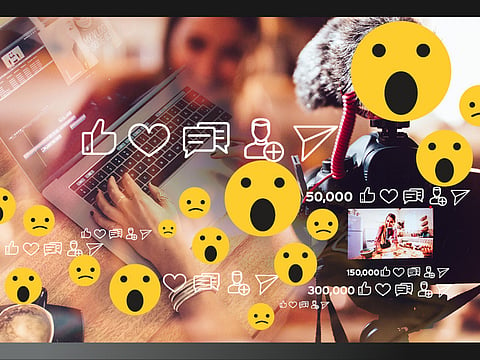Day of reckoning for social media influencers as new rules kick in
As deadline for getting mandatory licence ends on May 31, we find out where the UAE’s most followed community stands

Dubai: With the deadline for getting the mandatory licence to promote commercial activities through various electronic channels, including the social media, ending on May 31, it is a day of reckoning for the UAE’s vast community of influencers.
Dr Rashid Al Nuaimi, executive director of media affairs at the National Media Council, which will implement the new Electronic Media Regulations from June 1, has said: “The NMC requires licensing of individuals who have accounts on social media and conduct activities that are commercial in nature, such as advertisements that are done on a paid-for basis.”
Exclusions
At a workshop in the capital, he said, “Accounts, blogs and personal pages are not subject to these new regulations, including accounts of influencers on social media, provided they are not commercial in nature. Individuals and organisations that voluntarily promote work are not affected by Electronic Media Regulations.”
Influencers on their part are still trying to figure out where they stand. While the big names with millions of followers are generally associated with recognised channels and are licensed in any case, it’s the micro-players with 10,000-100,000 followers who are groping for answers.
Welcoming the new regulations, Feras Arafa, managing director of Influencers.ae, a regional marketing platform with over 2,500 influencers, said, “The new rules are a step in the right direction. They are primarily aimed at streamlining content that is not only safe but also in line with the cultural sensitivities of the country. For example, we cannot have someone endorse a weight loss product without the credentials to do it; or for that matter promote the consumption of alcohol.” Content apart, Arafa said the challenge before the influencers is that not all of them have what it takes to meet the “one-size-fits-all” formula.
“Big influencers charge huge amounts that could go up to Dh100,000 a post, but there are many others down the line who promote a product for just Dh500 or virtually free. Invariably, those in the second category do not make a living out of their influencer roles. It is something they do on the side, in addition to a regular job with an average salary.”
He said under the circumstances, such influencers are hard-pressed to come up with the Dh15,000 annual media licence fee in addition to the trade licence and virtual office costs, which put together could cross Dh30,000.
Follow the rules
The influencer community echoes his words.
Farhana Bodi, whose fashion and lifestyle posts on Instagram are followed by 220,000 people, said, “At the end of the day, we will follow the rules. I take up work through an agency so I will have to wait and see how things pan out. Having said that, there are many influencers out there who do not have regular work or income as an influencer. How will they manage?”
TV personality Uma Ghosh, who has 95,000 followers on YouTube and 56,900 followers on Instagram, said she considers herself an entrepreneur, wellness advocate and (certified) health coach, not an influencer. “The licence fee is a huge amount. I have my own TV production company and present TV shows. I have been a pioneering wellness advocate long before influencers as we know them today came about. I want to know what people like me should do?”
There’s another concern too: the jurisdiction of operation and influence.
Arafa said, “There’s room for improvement in consolidating with reality, in particular for the local micro-influencers’ community which constitutes over 78 per cent of the UAE influencer market. Micro-influencers who are not earning anywhere near the stereotyped amounts are at risk of being alienated, which will give influencers in other countries like Saudi Arabia and Kuwait a significant competitive advantage in dealing with brands that work on the GCC level.” Industry sources say the average number of influencers followed by a person in the UAE is 26.2 with “cool visuals” being the key to cut through the clutter. But influencers are not necessarily great photographers or writers. Some are accused of having little or no knowledge of what they promote. Dubious players have come in for much criticism the world over and are accused of becoming social media publishers in their own right, with the sole aim of building up a following only to cash in on it.
But the days of fake followers, fictitious engagement, fantastic fanfare and freebies could well be over, Arafa said, “We conducted a study last year in which we exposed how followers can be bought or traded. The phenomenon is like a virus that evolves itself. But as it evolves, so do the detection tools.”
Bilingual TV presenter and brand influencer Nouraldin Al Yousuf, who has 74,000 followers on Instagram, spoke of an “invasion” of influencers whose following may not necessarily be within the UAE. “But advertisers don’t know that. There’s also a huge disparity in pricing. Some are in it for the fame and freebies, bringing a bad name to the industry. We welcome the new law and are confident it will regulate the industry.”
Sign up for the Daily Briefing
Get the latest news and updates straight to your inbox



